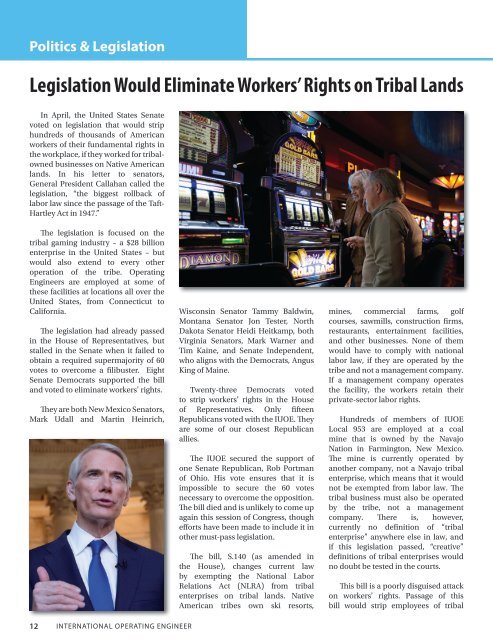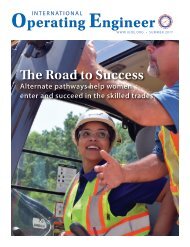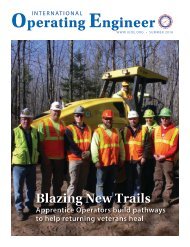International Operating Engineer - Spring 2018
The quarterly magazine of the International Union of Operating Engineers.
The quarterly magazine of the International Union of Operating Engineers.
Create successful ePaper yourself
Turn your PDF publications into a flip-book with our unique Google optimized e-Paper software.
Politics & Legislation<br />
Legislation Would Eliminate Workers’ Rights on Tribal Lands<br />
In April, the United States Senate<br />
voted on legislation that would strip<br />
hundreds of thousands of American<br />
workers of their fundamental rights in<br />
the workplace, if they worked for tribalowned<br />
businesses on Native American<br />
lands. In his letter to senators,<br />
General President Callahan called the<br />
legislation, “the biggest rollback of<br />
labor law since the passage of the Taft-<br />
Hartley Act in 1947.”<br />
The legislation is focused on the<br />
tribal gaming industry – a $28 billion<br />
enterprise in the United States – but<br />
would also extend to every other<br />
operation of the tribe. <strong>Operating</strong><br />
<strong>Engineer</strong>s are employed at some of<br />
these facilities at locations all over the<br />
United States, from Connecticut to<br />
California.<br />
The legislation had already passed<br />
in the House of Representatives, but<br />
stalled in the Senate when it failed to<br />
obtain a required supermajority of 60<br />
votes to overcome a filibuster. Eight<br />
Senate Democrats supported the bill<br />
and voted to eliminate workers’ rights.<br />
They are both New Mexico Senators,<br />
Mark Udall and Martin Heinrich,<br />
Wisconsin Senator Tammy Baldwin,<br />
Montana Senator Jon Tester, North<br />
Dakota Senator Heidi Heitkamp, both<br />
Virginia Senators, Mark Warner and<br />
Tim Kaine, and Senate Independent,<br />
who aligns with the Democrats, Angus<br />
King of Maine.<br />
Twenty-three Democrats voted<br />
to strip workers’ rights in the House<br />
of Representatives. Only fifteen<br />
Republicans voted with the IUOE. They<br />
are some of our closest Republican<br />
allies.<br />
The IUOE secured the support of<br />
one Senate Republican, Rob Portman<br />
of Ohio. His vote ensures that it is<br />
impossible to secure the 60 votes<br />
necessary to overcome the opposition.<br />
The bill died and is unlikely to come up<br />
again this session of Congress, though<br />
efforts have been made to include it in<br />
other must-pass legislation.<br />
The bill, S.140 (as amended in<br />
the House), changes current law<br />
by exempting the National Labor<br />
Relations Act (NLRA) from tribal<br />
enterprises on tribal lands. Native<br />
American tribes own ski resorts,<br />
mines, commercial farms, golf<br />
courses, sawmills, construction firms,<br />
restaurants, entertainment facilities,<br />
and other businesses. None of them<br />
would have to comply with national<br />
labor law, if they are operated by the<br />
tribe and not a management company.<br />
If a management company operates<br />
the facility, the workers retain their<br />
private-sector labor rights.<br />
Hundreds of members of IUOE<br />
Local 953 are employed at a coal<br />
mine that is owned by the Navajo<br />
Nation in Farmington, New Mexico.<br />
The mine is currently operated by<br />
another company, not a Navajo tribal<br />
enterprise, which means that it would<br />
not be exempted from labor law. The<br />
tribal business must also be operated<br />
by the tribe, not a management<br />
company. There is, however,<br />
currently no definition of “tribal<br />
enterprise” anywhere else in law, and<br />
if this legislation passed, “creative”<br />
definitions of tribal enterprises would<br />
no doubt be tested in the courts.<br />
This bill is a poorly disguised attack<br />
on workers’ rights. Passage of this<br />
bill would strip employees of tribal<br />
enterprises of their right to form unions<br />
and bargain collectively. Close to<br />
700,000 people work at Indian gaming<br />
facilities. Over 600,000 of them are not<br />
Native American.<br />
Hundreds of <strong>Operating</strong> <strong>Engineer</strong>s<br />
work in Native American gaming<br />
operations. Local 30 represents<br />
hundreds of workers at Foxwoods<br />
Casino in Connecticut and recently<br />
added 45 workers in an organizing<br />
drive. Locals 39 and 501 also represent<br />
hundreds of members at tribal gaming<br />
operations.<br />
The tribes maintain that they want<br />
to be treated like a state government.<br />
They argue that exempting them from<br />
private-sector labor law is a matter of<br />
sovereignty. But states don’t operate a<br />
$28 billion dollar gaming industry with<br />
700,000 workers.<br />
Testimony from the Native<br />
American Rights Fund laid bare the real<br />
reason for the legislation: The tribes<br />
want it because it will keep unions off<br />
the reservations. Another tribal witness<br />
said that they want to deny workers the<br />
right to strike. Make no mistake, this<br />
legislation is a business proposition<br />
for the Tribes. They are wielding<br />
their political power in an attempt to<br />
squash the fundamental rights of their<br />
employees.<br />
According to the National Indian<br />
Gaming Commission, Indian gaming<br />
generated $28 billion in revenue in fiscal<br />
year 2013 and operated 449 gaming<br />
facilities. Indian gaming enterprises<br />
also collectively paid 250 lobbyists over<br />
$24 million to lobby Congress in 2014<br />
and they contributed over $14 million<br />
in the 2014 election cycle to federal<br />
candidates and committees, according<br />
to the Center for Responsive Politics.<br />
[left] Senator Rob Portman (R-OH) voted to<br />
support the rights of <strong>Operating</strong> <strong>Engineer</strong>s<br />
and other workers who are employed<br />
by tribal-owned businesses on Native<br />
American lands.<br />
<strong>Operating</strong> <strong>Engineer</strong>s Beat Back<br />
Another Attack on Davis-Bacon<br />
ANTI-UNION ZEALOT, Congressman<br />
Steve King (R-IA), for the fourth time<br />
this Congress, introduced legislation<br />
which targeted the Davis-Bacon Act.<br />
King introduced an amendment to<br />
H.R. 4, the FAA Reauthorization Act of<br />
<strong>2018</strong>, which would have ensured that<br />
“no funds made available by the FAA<br />
Reauthorization Act could be used to<br />
enforce prevailing wage requirements<br />
required under the Davis-Bacon Act.”<br />
Like Rep. King’s previous attacks,<br />
this legislation was also defeated on<br />
the House floor. With the support of<br />
57 Republicans the amendment was<br />
defeated by a vote of 172-243 on April<br />
26th. We were happy to welcome the<br />
following first-time Republican supporters<br />
of the Davis-Bacon Act – Rep.<br />
Don Bacon (NE), Rep. Mike Bishop<br />
(MI), Rep. Billy Long (MO), and Chris<br />
Stewart (UT).<br />
Congressman Steve King believes<br />
that construction workers make too<br />
much money and the Davis-Bacon Act<br />
increases overall construction costs.<br />
However, the Davis-Bacon Act is just a<br />
common-sense policy which requires<br />
that contractors on a project with federal<br />
support – whether through federal<br />
loans, grants, or other types of financing<br />
– pay construction craftworkers a<br />
minimum wage that is established by<br />
the U.S. Department of Labor through<br />
a local survey of wages and benefits.<br />
The law simply prevents the federal<br />
government – a large, influential construction<br />
owner – from using precious<br />
tax dollars to undercut wage standards<br />
of local workers. It helps ensure quality<br />
construction, and it prevents large<br />
out-of-state contractors from undercutting<br />
local businesses. It ensures that<br />
bottom-feeding contractors can’t win a<br />
public construction project by lowering<br />
workers’ wages in a never-ending<br />
race to the bottom. They must compete<br />
on a level playing field with IUOE<br />
union contractors.<br />
Furthermore, the Davis-Bacon Act has<br />
no effect on total costs of construction.<br />
Opponents of the law invent imaginary<br />
savings to justify their anti-worker<br />
positions. Numerous studies have revealed<br />
that productivity makes up for<br />
any additional labor costs, essentially<br />
eliminating any cost-savings if the law<br />
was repealed.<br />
As long as Rep. Steve King remains in<br />
Congress, the <strong>Operating</strong> <strong>Engineer</strong>s<br />
should expect more of his anti-union<br />
attacks, but King should expect the<br />
<strong>Operating</strong> <strong>Engineer</strong>s to continue to<br />
defeat his anti-union agenda with the<br />
help of our members and supporters<br />
in Congress.<br />
ENGINEERS<br />
ACTION &<br />
RESPONSE<br />
NETWORK<br />
REGISTER TODAY!<br />
WWW.IUOE.ORG<br />
12 INTERNATIONAL OPERATING ENGINEER<br />
SPRING <strong>2018</strong> 13
















